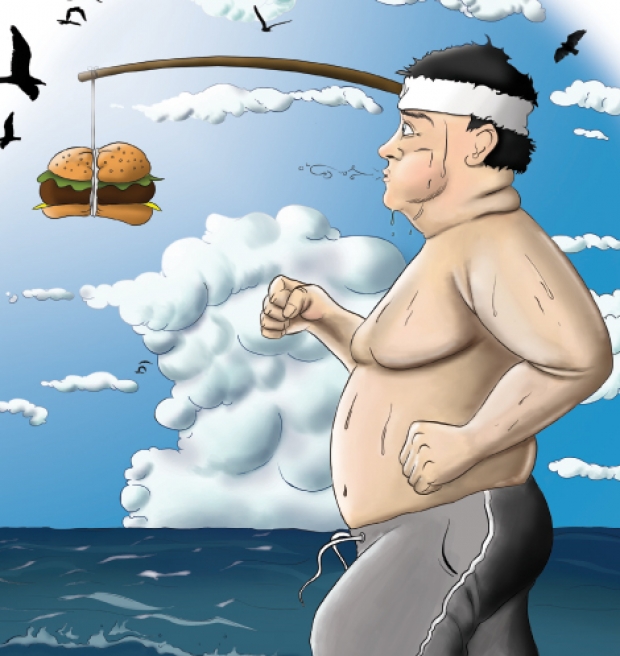Small changes to diet offer big benefits to the waistline

Who doesn’t love an extreme makeover? Cable and network TV are loaded with programs celebrating such transformations. Whether it’s a bad dining room transformed into a showpiece for entertaining or a lumpy body turned lean and mean, we all seem to relate to successful before-and-after photos and the stories that accompany them. By the time you’re reading this, I will (hopefully) be one of those success stories, well on my way to a healthy weight as I fight the good fight in my ongoing battle of the bulge.
On January 6, 2013, I weighed in at a large-and-in-charge 267 pounds. Not my all-time high of 275, but still way too much weight for my 5’ 11” frame. So in early January, while New Year’s resolutions were fresh in the air, I jumped on the bandwagon and began a new diet. I know “diet” is a bad word. The politically correct terminology is “meal plan,” “lifestyle,” blah, blah, blah. But let’s face it. It’s a diet. If it deprives me of pizza, eggnog and cheesecake, it’s a diet. My diet of choice was a 12-week challenge promoted by a popular nutrition and energy drink company that came with protein shakes, supplements and a meal plan that allowed for five small meals per day, and a gradually increasing exercise program that left the hard part (the willpower) to me.
I once asked a friend of mine, a personal trainer, which diet program he thought was best: Atkins, Mediterranean, low-fat, low-carb, Beverly Hills, South Beach, Myrtle Beach, Aynor. He told me “they all work, if you do them.” And therein lies the rub. I’ve always known what to do. My internal nutrition database is fully informed. I can recite, with amazing accuracy, the fat content, calories, carbs and nutritional make-up of just about every food you might test me on. I’ve read countless books, studied package labels for 20 years, and know what’s good for me and why.
The knowledge has never been the problem. I always lacked the will. To fully understand this, it might help to go back a few years.
My earliest recollection of being overweight goes back to childhood. Family photos confirm that I was a chubby kid, really chubby, from about 8 years old to around 12. Adolescence, thankfully, rescued my teen and young adult years. As I grew taller, I stretched it all out and was a normal, healthy weight between 13 years old to around 28 years old. Then I moved from upstate New York to Nashville, home of Southern cooking, the meat-and-three and blackberry cobbler with ice cream for lunch every day, and thus started my steady assent into fathood.
For the next decade I gained 5 to 10 pounds per year, starting at a healthy-for-me 185 pounds, until I freaked out when the scale threatened 300. I wore the weight pretty well, no one guessed I was that heavy, but as I got older my metabolism slowed. When I hit 275 pounds I got serious and dropped 60 pounds, then I put it back on, and have spent the past 15 years going up and down.
Though it’s proven that genetics plays some role, everyone can maintain a healthy weight. Some have to work really hard at it, and for others it requires almost no effort. Those in that lucky minority have metabolisms that burn calories like erupting volcanoes and they never put on weight, no matter what they eat. I don’t like these people. And some, like the morbidly obese, have such screwed up metabolisms that even relatively low calorie programs barely manage to keep them steady. For those in that difficult predicament, drastic measures, like bariatric surgery, are sometimes recommended. Most of us who are overweight fall somewhere in between pigging out at will and going under the knife. Our first line of defense is losing weight the old fashioned way—diet and exercise.
Because of our publishing schedule, as I write this I’m still in the early stages of my twelve-week challenge, but I’m happy to report I’ve dropped 21 pounds, and still get a slice of pizza and a small serving of blackberry cobbler every so often. Dieting is hard, especially when you’re a bit of a foodie, but the alternatives—a much greater risk of Type II Diabetes, heart disease, hypertension and cancer—are worse.
Illustration by Octavian Johnson